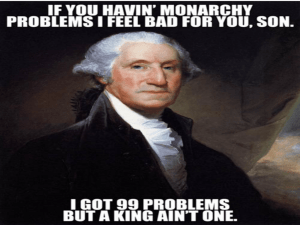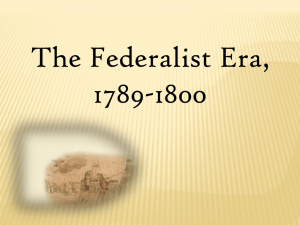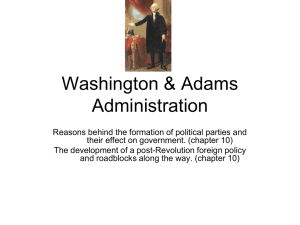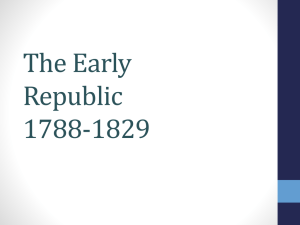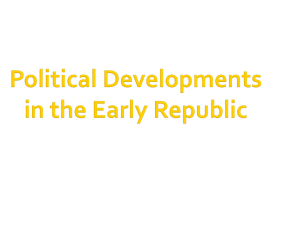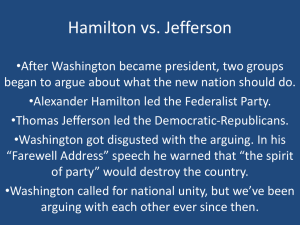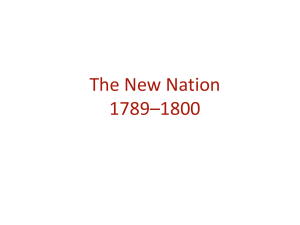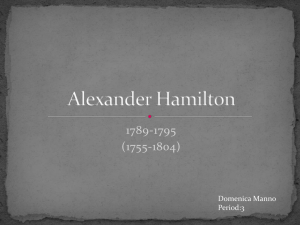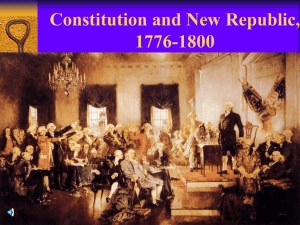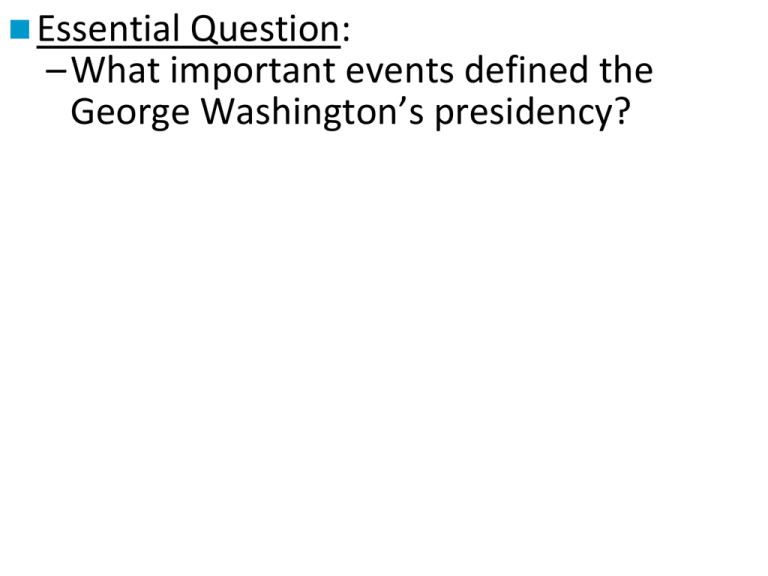
Essential Question:
–What important events defined the
George Washington’s presidency?
When the Constitution was ratified in 1789, George
Washington was unanimously elected 1st president
Washington helped shape the new nation and
created precedents for future presidents and leaders
During his first term, President Washington focused
on domestic issues that would shape the new nation
Congress passed the
Judiciary Act of 1789
which created federal courts
Congress created the
Treasury, State, War,
Justice Departments
Washington created the 1st
cabinet (group of advisors
who head departments)
Henry Knox,
Secretary of War
Alexander Hamilton,
Secretary of Treasury
George Washington,
President
Thomas Jefferson,
Secretary of State
Edmund Randolph,
Attorney General
Alexander Hamilton was
named Secretary of Treasury
(Treasury Department deals with
issues involving money or taxes)
Hamilton and Jefferson were the
most influential of Washington’s
cabinet, but they had different
views on the role of government
Thomas Jefferson was
named Secretary of State
(State Department deals with
issues involving foreign nations)
Watch this video clip from HBO’s John Adams series
As you watch, identify as many things as you can
that Jefferson and Hamilton disagree about
Alexander Hamilton
Thomas Jefferson
Should power be in the hands of
the “elite” or the “common man”?
Alexander Hamilton
Hamilton
People are
motivated by
self-interests
Power should
be in the hands
of the “elite”
Thomas Jefferson
Jefferson
The “common man”
should be trusted to
make good decisions
Corruption occurs
when power is in the
hands of the “elite”
Which government should be stronger:
the national government or the states?
Alexander Hamilton
Hamilton
The national
government needs
to be stronger than
the states
The Articles of
Confederation was
too weak
Thomas Jefferson
Jefferson
Power should
remain with the
state governments
The national
government
should be kept as
small as possible
What was their view on the Constitution?
Alexander Hamilton
Hamilton
Supported the
Constitution
because it included
a president and
more power to the
national government
Constitution can be
“loosely” interpreted
(“Elastic Clause”)
Thomas Jefferson
Jefferson
Supported the
Constitution because
of the Bill of Rights
Constitution should
be “strictly”
interpreted with
powers not given to
the gov’t are
reserved to the states
What political party did he form and
what were the core ideals of the party?
Alexander Hamilton
Hamilton
Federalist Party
Strong national
government and
fewer states’ rights
Thomas Jefferson
Jefferson
DemocraticRepublican Party
Limited national
government with
more rights reserved
to the states
What should be the focus
of the American economy?
Alexander Hamilton
Hamilton
The government
should promote
banking and the
growth of American
industry so the
USA does not have
to rely on Britain
Thomas Jefferson
Jefferson
The government
should promote an
economy of
self-sufficient
farmers who do not
need a powerful
national gov’t
Alexander Hamilton
believed that a strong
national government
was necessary to provide
order in America
He wanted to build a
strong economy focused
on industry so America
could be self-sufficient
He believed that the
Constitution should be
loosely interpreted to
allow the government
to respond to issues
Thomas Jefferson
believed that political
power should remain
with state governments
in order to protect liberty
He wanted the economy
to remain focused on
farming and the gov’t
to protect farmers
He believed that the
Constitution should be
strictly interpreted with
all other powers reserved
to state governments
Among their biggest disagreement
was over Hamilton’s Financial Plan
In 1789, Hamilton proposed a
financial plan that would guide
the future of the U.S. economy
1. Hamilton proposed
funding and assumption of
all state debts incurred
Congress and
during the Revolutionary War
Washington
approved
By taking the state debts, the
Hamilton’s plan
USA government would force
for funding and
the states to work together
assumption
By repaying all debts, the
USA would gain foreign credit
2. To raise money for the new nation, Hamilton
proposed a tax on whiskey and a creating a
protective tariff on foreign manufactured goods
that would promote American industry
Congress and
Washington
approved
Hamilton’s
whiskey tax
But did not
approve
Hamilton’s
protective
tariff
3. Hamilton proposed creating a Bank of the U.S.
(BUS) that would regulate the money supply by
holding federal funds and loaning it to state banks
Jefferson argued that the BUS was
unconstitutional and gave too much
power to bankers in cities
President Washington agreed with
Hamilton and Congress passed a law
creating the Bank of the U.S. in 1791
Hamilton argued that the BUS was
“necessary and proper” to control the
economy and regulate currency
The disagreements between Hamilton and Jefferson
led to the formation of America’s first political parties
Federalists supported
a strong national
government…
…loose interpretation
of the Constitution…
Hamilton
formed
the
Federalist
Party
…a strong financial
system that favored
banks and industry…
…supporting England
when war broke out
with France
The disagreements between Hamilton and Jefferson
led to the formation of America’s first political parties
Republicans supported
strong state
governments…
…strict interpretation
of the Constitution…
…state banks and
policies that support
small farmers…
…supporting France
when war broke out
with England
Jefferson
formed the
DemocraticRepublican
Party
After 4 years, George Washington was
unanimously elected president for a second term
In his second term (1793-1797), Washington had to
solve serious problems that faced the young nation
In 1793, war broke out
between Britain and France
after the French Revolution
France tried to gain an
American alliance in
their war with Britain
Jefferson wanted
the USA to support
France and their
fight for liberty
Hamilton wanted
to support Britain
in order to avoid
angering our largest
trade partner
In 1793, Washington
made an important
foreign policy precedent
with his Proclamation
of Neutrality
President Washington
believed that America
was too young to involve
itself in a European war
America politicians
remained neutral in
European affairs from
1793 to 1898
In 1794, Washington
faced another crisis:
the Whiskey Rebellion
Hamilton’s whiskey tax
frustrated western farmers
in Pennsylvania who saw it
as an unfair tax on the poor
When Shays’ Rebellion
broke out in 1787,
the weak government
under the Articles of
Confederation could
not stop the rebellion
Reminder!
When the Whiskey
Rebellion began in 1794,
President Washington
saw the uprising as a
threat to public safety
“Whenever the government
appears in arms [against a
riot or insurrection], it ought
to appear like Hercules,
and inspire respect by the
display of strength”
“A little rebellion now and then
is a good thing, and necessary
in the political world as storms
in the physical. It is a medicine
necessary for the sound
health of government”
President Washington
mobilized an army of
13,000 soldiers which
ended the rebellion
The quick end to the rebellion
revealed the strength of the
new national government
under the Constitution
In 1796, Washington
chose not to run for a
3rd term as president
He was afraid that if he
died in office, it would
create a precedent that
presidents can serve for life
There was no term limit
in the Constitution,
but Washington created
the precedent that
no president serve more
than two terms
In 1796, George Washington
gave advice to the nation
in his Farewell Address
Washington warned against
the growth of “factions”
and political parties
He warned against growing
sectional tensions between
the North and South
He restated his desire for
neutrality by warning
against entangling alliances

